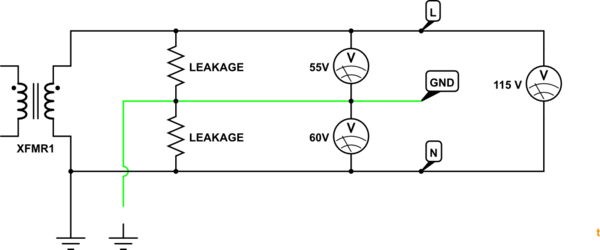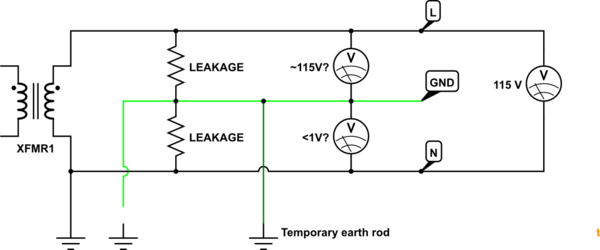I accepted an answer to a similar question recently, but I now have additional information and have realized that I need a more specific answer. I am nearly certain that my landlord will be unhappy about fixing this and try to claim there is no problem, and I would like to get as close as I can to figuring out what the real problem is, given that I have no training and no diagnostic tools beyond a multi-meter.
I have an APC battery backup and surge protector for my computer. It has a light, labeled "Building wiring fault." This light is on, and my computer will not start. So I bought a multi-meter (Etekcity MSR-C600).
Checking voltages at the outlet, I found the following:
- Hot to neutral: 117.5
- Hot to ground: 60.8
- Neutral to ground: 55.9
I then checked the voltage several other outlets. All of them have the same hot to neutral voltage, but the hot to ground and neutral to ground vary considerably. For example, another socket had:
- Hot to ground: 77.2
- Neutral to ground: 36.5
This difference is puzzling given that all the outlets in my apartment are on a single circuit.
I unplugged every appliance in my apartment and retested every outlet. The results were exactly the same.
I have tested several outlets in two of the other three apartments in the building. The one on the same floor has several outlets that are just like the first one I tested above, and also some outlets with readings that are just what they should be. The apartment above me has the same problems as mine, but with a lower voltage to ground, about 15 to 20 volts, again from both the hot and the neutral.
I called PG&E and they sent a guy out. He tested the neutral against the ground at the meter and found no voltage. He also checked the wire connections at the building and found no problem.
Is this sufficient to tell me the most likely cause of the problem? I have been wracking my brains to try to postulate any electrical fault that would result in the pattern of voltages that I am seeing (and I have checked all these readings multiple times) and I have failed completely. It seems to me that a floating ground should have no voltage to the hot. If the ground was shorted to the hot, there should be no voltage to the hot and ~115 volts to the neutral. If shorted to the neutral, there should be 115 to the hot, and no voltage to the neutral.
The only pattern I can imagine that partially fits is if there is a short between the hot and the ground with a significant resistance in between. But that still does not account for the variation across outlets. And I also don't understand how this problem can affect multiple apartments when we are all on different meters, which we are. Finally, in my apartment the sum of the ground to neutral and the ground to hot is about equal to the hot to neutral. But in the apartment upstairs, the two voltages are still roughly equal, but sum to only about a fifth of the hot to neutral.
One thing that may be relevant: there is rigid conduit to an outlet in my kitchen, which extends past the outlet as flexible conduit and is then clamped to a pipe attached to my hot water heater. I have not yet checked whether there is a similar arrangement in the other apartments.
Given the above, how do I go about locating and identifying the actual wiring problem?


